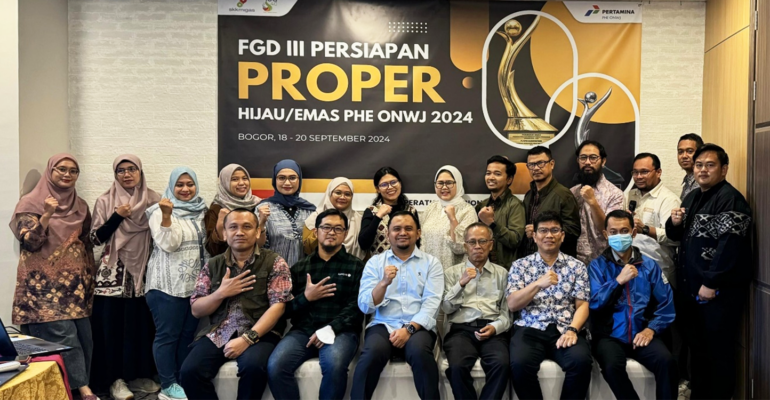PHE ONWJ Workshop, Prof Hefni Effendi Presents Environmental Management Strategies for Optimal Proper Achievement

IPB University Professor, Prof Hefni Effendi attended a workshop held by Pertamina Hulu Energi – Offshore Northwest Java (PHE ONWJ). The workshop was in preparation for the optimum achievement of PHE ONWJ’s participation in the Company Performance Rating Assessment Programme (Proper). The workshop was to enrich the knowledge of the Health, Safety, Security, and Environment (HSSE) staff on what components must be strengthened.
Proper is a form of appreciation by the Ministry of Environment and Forestry (KLHK) to corporations regarding their environmental management performance. Meanwhile, environmental performance awards to individuals who have devoted their lives are delivered in the form of Kalpataru. Environmental performance awards for cities are expressed in the form of Adipura.
Prof Hefni, who is also the Chairman of the Department of Aquatic Resource Management (MSP), Faculty of Fisheries and Marine Science (FPIK) IPB University, outlined a number of concrete efforts that can be made in order to increase points in participation in Proper.
“For example, when we maintain the sustainability of biodiversity, it will also indirectly nourish humans who depend on biodiversity for their livelihood, and also have consequences for health and economic sustainability,” he explained.
According to Prof Hefni, as a globally oriented corporation that is committed to maintaining the quality of the environment around the Mining Working Area (WKP), PHE ONWJ is of course very interested in conducting environmental safeguards.
However, he emphasised that the ultimate goal of environmental management is not merely to fulfil obligations, but far beyond compliance.
“Therefore, PHE ONWJ applies a number of management that is not only obligatory in this country, but also applies environmental management instruments that are voluntary. PHE ONWJ’s participation in Proper represents this concern,” he said.
At the workshop, Prof Hefni explained several steps in environmental management. In the context of preserving habitat and conserving biodiversity that includes macroscopic and microscopic organisms, these steps include. 1) Protecting and expanding protected areas, 2) Sustainable land use practices, 3) Wildlife and invasive animal conservation programmes.
In addition, the next environmental management measures are 4) Sustainable fishing practices, 5) Increased public awareness on conservation, 6) Collaboration with government, NGOs, and community groups, 7) Financial incentives for investors, etc.
“Biodiversity management efforts are carried out on the insitu and exitu spectrum by involving various stakeholders such as business actors, government, non-governmental organisations (NGOs), community groups, and academics known as pentahelix,” he said. Prof Hefni also highlighted the use of current technology applications such as IoT (Internet of Things) in environmental management.
For him, PHE ONWJ has made many breakthroughs in environmental management, such as the mangrove rehabilitation programme on the north coast of Java and coral reef transplantation. Both programmes have shown results. However, these success stories have not been well publicised to the public. Therefore, Prof Hefni emphasised that campaigning and education efforts need to be maximised.
“Simple things in the short term such as making leaflets, videography, concise pocket books, popular scientific info via social media about biodiversity management in particular and environmental management in a broad sense that has been routinely carried out by PHE ONWJ in collaboration with IPB University, need to be encouraged,” he suggested. (*/Rz) (IAAS/RUM)



